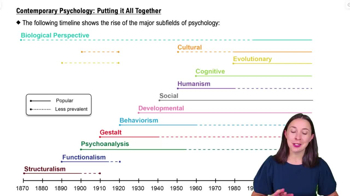Table of contents
- 1. Introduction to Psychology1h 43m
- 2. Psychology Research2h 20m
- 3. Biological Psychology2h 41m
- 4. Sensation and Perception28m
- 5. Consciousness and Sleep32m
- 6. Learning41m
- 7. Memory34m
- 8. Cognition37m
- 9. Emotion and Motivation35m
- 10. Developmental Psychology33m
- 11. Personality48m
- 12. Social Psychology41m
- 13. Stress and Health41m
- 14. Psychological Disorders44m
- 15. Treatment47m
1. Introduction to Psychology
Contemporary Psychology: Putting it All Together
Struggling with Psychology?
Join thousands of students who trust us to help them ace their exams!Watch the first videoMultiple Choice
The sociocultural perspective studies
A
the effects of biology on people's behavior.
B
the effect people have on one another, both individually and in a large group.
C
how evolution has influenced adaptive human behaviors.
D
how our genes shape who we are.
 Verified step by step guidance
Verified step by step guidance1
Identify the key focus of the sociocultural perspective in psychology, which is understanding how social and cultural factors influence individual behavior.
Consider the role of social interactions and cultural norms in shaping behaviors, beliefs, and attitudes.
Analyze how individuals are affected by the presence and actions of others, both in one-on-one interactions and within larger groups.
Reflect on the impact of cultural background, societal expectations, and group dynamics on personal behavior and decision-making.
Differentiate the sociocultural perspective from other psychological perspectives, such as biological or evolutionary, which focus on genetic and evolutionary influences on behavior.

 4:54m
4:54mWatch next
Master Contemporary Psychology with a bite sized video explanation from Hannah Gordils
Start learningRelated Videos
Related Practice




















